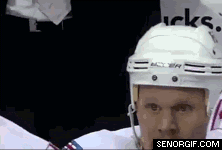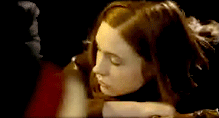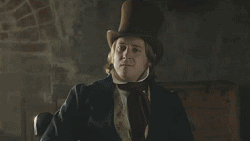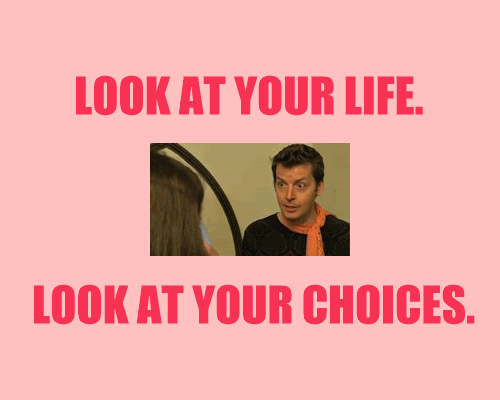Note The Second: If you enjoyed this series, be warned that I did not. And I will review accordingly. I look forward to your emails.
Synopsis: (h/t Goodreads) - This arc of Scott Westerfeld's UGLIES trilogy follows the high-tech adventures of Tally Youngblood. As an ugly, then a pretty, and finally a special, Tally works to take down a society created to function with perfect-looking people who never have a chance to think for themselves.
My Review: Oh, Uglies. What can I say about Uglies? The short answer to that question would be that it's a your basic "bait-and-switch" story. You think you're getting one thing, but end up with something completely different. And that can sometimes be a good thing, but this is a case where it goes horribly, horribly wrong.
In this world, people are taken when they are sixteen and made "pretty" - that is, they are subjected to radical surgery to make them look extraordinarily attractive. Bones are lengthened, faces are re-shaped, skin is even reconstituted to do away with acne and other skin problems. The trade-off in all this (I guess you could call it a trade-off) is that New Pretties (as they are called soon after the surgery) are incredibly stupid. Their sense of logic and common sense gets taken out of them during the operation. The biggest decision any of them ever has to make is what color feather boa to wear to a costume party (the pink one's out because you wore that to last night's costume party). "Fun" for pretties involves jumping off buildings and ice-skating on hovering ice rinks. The government provides safety equipment like bungee jackets and crash bracelets to prevent major injury and any minor scrapes and bruises can easily be fixed by an easy surge - because any kind of scar or blemish is "totally bogus" (Gladly, "bogus" doesn't get used in the narrative until Pretties otherwise I would have found everything intolerable. Even more than I already did).
At the start of Uglies, Tally Youngblood is the last one in her age group to get the operation. Her best friend, Peris, has recently gone through the operation and is now living in New Pretty Town. Tally misses Peris and sneaks into New Pretty Town to see him and she is taken aback by how much he's changed. Tally later meets a fellow ugly-waiting-to-turn-pretty, Shay. Shay introduces Tally to the Smoke, which is an underground rebellion of sorts. These people have run away from the pretty operation because they find out that it's nothing more than government-sponsored mind control - the operation includes putting "lesions" on the brain to make the Pretties more stupid and, thus, easier to control (I question the use of the term "lesions" in that it's an instance of You Keep Using That Word. Then again, I'm not a brain surgeon). Tally, however, winds up being recruited as a spy by Dr. Cable in the Special Circumstances division. Tally is tasked with infiltrating the Smoke and giving it up to the Specials so the government can put down any rebellion. To make a long story short, Tally finds the Smoke, falls in love with David (their leader), goes through the classic "Should I? Shouldn't I?" debate with herself. The Specials come in, raid the Smoke, Shay gets captured and turned into a Pretty and Tally gives herself up to the operation in order to save Shay.
That's the gist of Uglies and that's the best the series gets. Questionable government policies designed to keep the general populace down? Main character thrown in the middle of a rebellion? Potential love interest? Infiltrating the enemy camp to save your friends?

Unfortunately, it never gets off the ground.
Before I go on to Pretties, I have to make special mention of the scenes of the Smoke in Uglies. The Smoke is AMAZING! Westerfeld takes so much time to describe the Smoke and how things work in that society that the reader is led to believe that a significant portion of our time will be spent there. And I am completely okay with that. But (and it's a big BUT!) in the course of two chapters the Specials zoom in and, like a hoard of Vikings, pillage and plunder the place and it's gone. We never see the Smoke again. Which is very disheartening, considering (A) How long it took Tally to get there, (B) How quickly she starts to feel at home and (C) The most interesting characters we meet in this entire series are in the Smoke. Why spend so much time on something that's never going to be that important later on?
So next - Pretties -
The beginning of Pretties is so jarring and not at all what Uglies was. My main problem with Pretties is that Tally and Shay became so unbearably stupid and I didn't care about them anymore. Not the way that I cared about them in Uglies. And I just could not get into the pretties' air-headed vocabulary, which is saturated in the narrative. Words like "bogus" and "bubbly" mean nothing to me, further advancing the idea that I really have no need to care about this story (and can we please go one page without using a phrase like "ugly-making" or "nervous-making"? That was just irritating).
Westerfeld spends the first half of the book establishing who the Pretties are and how their world works and - to quote Mr. Butler - frankly my dear, I don't give a damn. It was well-established in Uglies that being Pretty is not a desirable trait (at least, to people who actually know what it involves. The people who become Pretty are too brain-dead to care) and what the government does to these people is wrong. I really don't want to be in New Pretty Town with absolutely nothing happening to advance the plot. Let's move on to the part where Tally overthrows the government and Dr. Cable goes slunking back to the sewer where she crawled out of.
Well, if I have to be stuck in New Pretty Town, I might as well talk about Zane. Zane is... well, Zane is the fictional-character equivalent of this gif:

Zane comes out of nowhere, he suddenly becomes Tally's "OMG BESTEST BEST BFF!" and the third (or fourth, depending on who you ask) piece of a mostly useless love triangle. Again, we are given no reason to care about him, but it's expected that we should. He has no motivation other than to follow Tally around like a lost puppy (for reasons that I have yet to hear about) and just generally be annoying. My question is this: You had Peris established as Tally's very best friend in the first chapter of Uglies. Why in the name of sanity would you introduce this useless lump in the second book? Zane's role could easily have been moved to Peris, thus justifying the latter's existence and leaving me with one less headache (however, I was cheering for Zane's anti-gravity bungee jacket to fail as he fell off the floating ice rink. Tears were shed when that didn't happen).
Noticeably absent from Pretties is David. Oh, he gets a courtesy mention here and there, but the supposed leader of the opposition that's also the main character's love interest (the one that's actually interesting) doesn't really show up at all. It's like this plot is allergic to well-rounded, exciting characters. Even Tally, who was interesting and thoughtful in the first book, has been demoted to the characterization of moldy chunk of cheese. And when she starts to fight the pretty-induced idiocy, she doesn't get beyond Bella Swan (aka Pants) territory in terms of how interesting her character is. I have lost the will to care.

Pretties ends with Tally getting caught (again!) - this time by Shay, who has been recruited by Special Circumstances and been turned - well - Special. Now, the Specials are people who've had an operation that makes the pretty-operation look like a haricut. Specials are designed to be killers - they have (among other things) quicker reflexes, they have sharp hearing, they have extremely sharp teeth and they have this "Skintenna" which allows them to communicate with each other via thoughts. This is probably as close as any science-fiction story will get to acknowledging fantasy characters such as faeries and Tolkien-esque elves. Specials should be cool, no?

The answer to that is - if you haven't guessed by now - a resounding NO! If anything, it gets worse.
As Specials, Tally and Shay have a new set of vocabulary (of course they do) that we readers have to get used to all over again. I will give Westerfeld some credit - at least it makes sense to call Pretties "bubble-heads." But there's also the same manufactured drama that's been going on for two books already and I was left feeling like there was no point in going through everything all over again. Every time Tally got a new "brain" (twice - once when she became Pretty and once when she became Special) she had to reassert herself as a character and it fell flat every time. I was left pining for the curious, intriguing and compelling cute little Ugly that Tally was in the first book. But that version Tally was essentially erased from the narrative - which, I can see how that would be an effective plot device. But it leaves me feeling like I've missed something because by this point I have lost all desire and ability to care about Tally or Shay or David (where the hell has he been this whole time?) or even Butt-Monkey Zane. I'm hoping a stray comet comes in a pummels everyone to death so I don't have to deal with the whining anymore.
This brings me to the ending of Specials. Oh, the ending... I have a special place for you (no pun intended) -
So, it's been established that the government of this world pretty much sucks. It takes people and promises something fantastic and brilliant (i.e. the gift of being gorgeous and popular and all those things we wanted to be in middle school) and give it to them while also taking away their ability to make intelligent decisions and exercise free will on their own. This is SERIOUS BUSINESS and needs to be dealt with accordingly. However, when Dr. Cable (who is the stand-in for the government in this story) is caught, Tally takes pity on her because - this is when I chucked the book across the room - Dr. Cable created the Specials and it would devastate the dear doctor's heart to have all her work destroyed.

And this only gets better - I haven't yet mentioned the Rusties in this review (which is amazing since Tally thought of them EVERY OTHER STINKING SENTENCE!) In a nutshell, the Rusties are us. At least, the planet-raping, oil-drinking, car-driving, tree-cutting-down, nasty-people-who-don't-recycle version you only see in shows like "Captain Planet." The Rusties were destroyed when a virus that replicates in oil got loose and killed everyone and now all the Rusty cities are just ruined shells and serve as a reminder of what happens when you don't use those silly curly-bob lightbulbs (OH THE HUMANITY!!!1!!!) At first, I just thought the Rusty mythology was there to explain why this world exists - the government had to step in and save people from themselves. Which meant turning them all into mindless drones that could easily be controlled by plastic surgery and drunken parties (Yes, that's soooo much better). Anyway, the Rusties really don't have anything to do with the plot at large other than one of their ruined cities serves as a hideout for the New Smokies and it's a good place to have covert planning sessions (not that we get to see any of that subversive coolness going down, anyway).
Once Tally and company take down Dr. Cable and the government at large, Tally realizes something terrible that, duh, stupid reader - you should have seen this coming. What, you didn't??? Well, aren't you just an idiot. The government's policy of brain control was actually HELPING people. God forbid we let people think for themselves! Because free will = freedom of thought = potential for mistakes = potential for stupidity = people get hurt and Bad Things Happen (and baby seals get eaten by mean, mean tankers in the ocean spreading fear and harm and industry throughout the world. OH NOES!)
So, what does Tally do? She finds David (who finally can be arsed up to make an appearance - at the end of the whole story) and they run off to the wilds to be free and fight off the evilness of regular people who have had their their freedom to choose restored to them... which is something I thought they were actually fighting for in the whole series?

At this point, I was so pissed off with the whole series - not just for it's hidden "Green Aesop" nonsense, but because it actually becomes a Broken Aesop (while we're linking to TV Tropes...) If you want to tell a "Save the Planet" kind of story, then do it! But make sure your audience knows what it's getting. Don't hide behind the promise of a thrilling dystopian adventure and then pull the rug out from under them towards the end. The one thing that makes me distrust writers the most is when I think I'm getting one thing, but I wind up with something completely different. I'm okay with being surprised within the plot, but I am not okay with switching genres and/or motivation partway through the story.
Suffice it to say that at this point, I had no desire to finish the series. Extras will not be joining the rest of these novels because I just don't want to read it anymore. And the sad thing is that, while I was reading Uglies, I started reading Scott Westerfeld's Leviathan, which I plowed through at a pace comparable to how fast I read Harry Potter. And I actually enjoyed those books, so I know Westerfeld can write compelling characters and plots. For some reason, he just didn't do it here. And he threw in a fake-out ending as a bonus.
Bottom Line: This series could have been so much better. The sad fact is that it wasn't. A combination of flat characters and the long absence of characters that were actually interesting coupled with a preachy "Moral of the Story" that ultimately had nothing to do with any of the preceding plot makes for something that I just could not care less about. Stories are meant to be engaging and enjoyable. The Uglies series was neither.

No comments:
Post a Comment